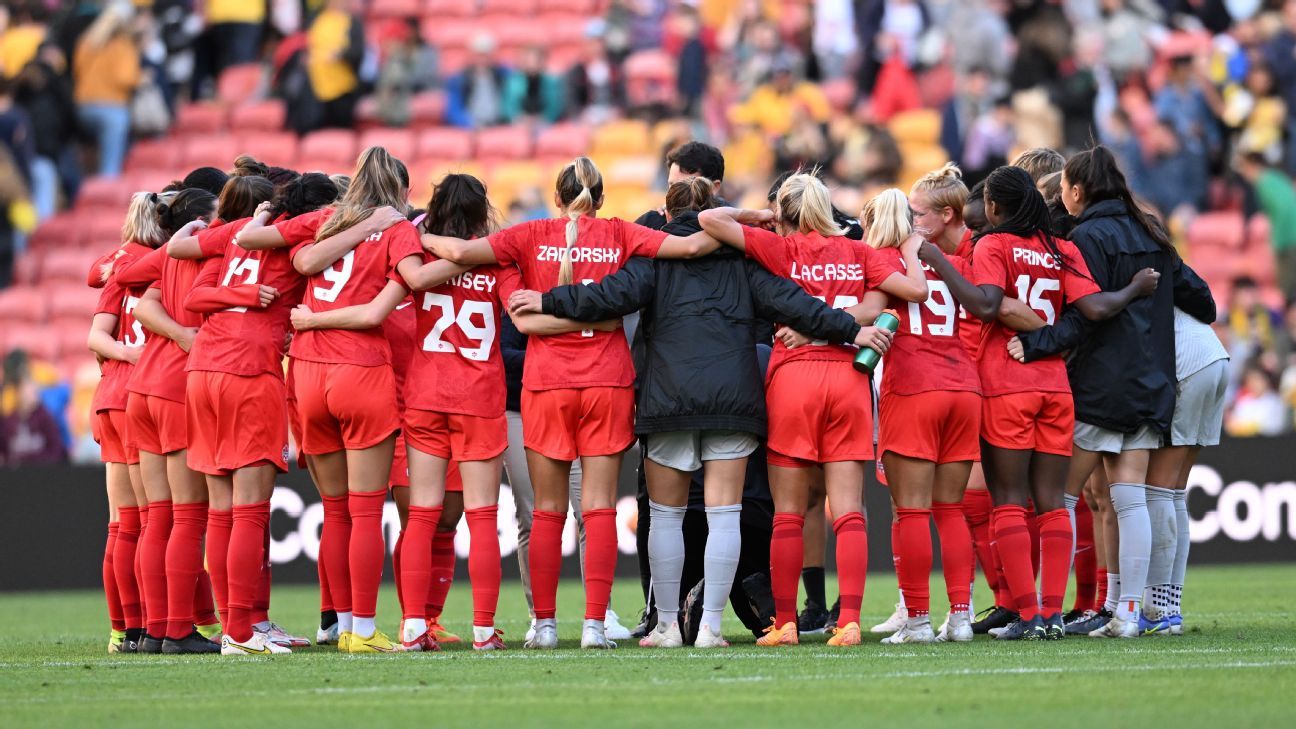Products You May Like
ORLANDO, Fla. — The Canada women’s team players said they will not participate in matches in April if their dispute with the Canada Soccer Association is not resolved.
The players did confirm they will play, albeit under protest, in the SheBelieves Cup, a four-team tournament in the United States that kicks off this week. They did not share their specific protest plans on Tuesday.
The players say their demands go beyond financials, but they allege they were not paid at all in 2022. They said they are seeking equal pay with the men’s team going forward, but they also want to see equal investment in resources for the program, including increased staffing.
Their demands come as the Canadian Soccer Association (CSA) plan widespread budget cuts.
“This could be our most important fight that we ever have as national team players and it’s one that we are determined to win,” said longtime captain Christine Sinclair, the world’s all-time leading international goal-scorer.
The players attempted to strike last week ahead of the SheBelieves Cup but were threatened with legal action by the Canada Soccer Association.
A day later, players said they were again threatened with legal action the association said could make them liable for millions of dollars personally.
“Canada Soccer was not prepared to jeopardize the SheBelieves Cup tournament,” the federation said in a statement on Saturday, noting that Ontario labor law did not legally allow the players to strike without a 17-day window of notice.
Canada’s men’s players said they “wholeheartedly support” the women.
On Tuesday, four leading players organized their own impromptu media call to discuss what they could of the situation, noting that they were not at liberty to discuss certain legal matters and ongoing negotiations, including what transpired in Saturday’s meeting.
The CSA’s counsel sat in on the call.
Midfielder Sophie Schmidt opened the call by announcing that she would retire following this summer’s World Cup.
The 18-year veteran of the team had posted to her social media accounts on Friday that she could no longer represent her country under these circumstances.
On Tuesday, Schmidt said conversations with Sinclair and head coach Bev Priestman convinced her to stick around through the World Cup.
“This is my choice, and I choose to stay and play through my teammates,” Schmidt said, holding back tears as she read a prepared statement from her phone.
At times, Canada’s women’s national team success felt like it came in spite of the federation’s lack of investment.
Among the noticeable, historical trends is the team’s lack of programming, especially at home, where revenue-generating and fan-building matches are too rarely played.
Canada hosted the 2015 World Cup and then did not play at home again until a year later, a move many felt failed to capitalize on the World Cup’s momentum.
The Canadian women won Olympic bronze medals in 2012 and 2016 before earning a historic gold medal in Tokyo in 2021.
Then came the men’s World Cup in Qatar at the end of 2022. Canada’s men, guided by its former women’s coach, John Herdman, qualified for the tournament for the first time in 36 years.
Canada women’s forward Janine Beckie was on the ground in Qatar and was amazed to see resources for the men’s team that she said had never been afforded to the historically more successful women’s squad.
Beckie said she witnessed the men’s team receive approximately double the staff that the women’s team has.
“If that’s the case with the men’s team, then we expect to be given every staff that Bev requests at our World Cup in a few months,” she said.
A common scene in women’s national team camps, Beckie said, is that staff members have to join full-field training just to make up 11-vs.-11 numbers.
She also referenced Canada not scheduling games for the women in every FIFA window, and how that can hinder development.
Those revelations, Sinclair said Tuesday, were the true tipping point to what she referred to as a “constant battle with the CSA” to put forth better collective bargaining agreements.
“For the longest time, as a women’s team, we’ve been fighting blindly, not knowing what our federation was capable of, in a way, in terms of support,” Sinclair said.
“And then all of us were witnessed to the support that our men’s team received from our association as they prepared for their World Cup.”
Women’s players also raised renewed questions about the federation’s relationship with Canada Soccer Business, a private company controlled by the owners of the Canadian Premier League, a relatively new men’s domestic competition.
The federation gives up media and sponsorship rights to the company in exchange for a fee reportedly worth $3-4 million annually.
Three years ago, the United States women’s national team played the final game of the SheBelieves tournament under protest of its federation as their equal play lawsuit dragged on.
Following the release of court arguments that depicted U.S. Soccer’s counsel arguing that women were inferior athletes, players turned their warm-up jerseys inside out to hide the U.S. Soccer logo and show only the stitching of the four stars representing the team’s four World Cup titles.
“It’s pretty disgusting that we’re having to ask just to be treated equally,” Beckie said. “It’s a fight that women all over the world have to partake in every single day. But quite frankly, we’re really sick of it and it’s something that now I don’t even get disappointed by anymore, I just get angry because it’s 2023.
“We won the damn Olympic Games and we’re about to go to the World Cup with a team who could win it. So, we expect to be prepared in the best way possible to go win a World Cup.”
